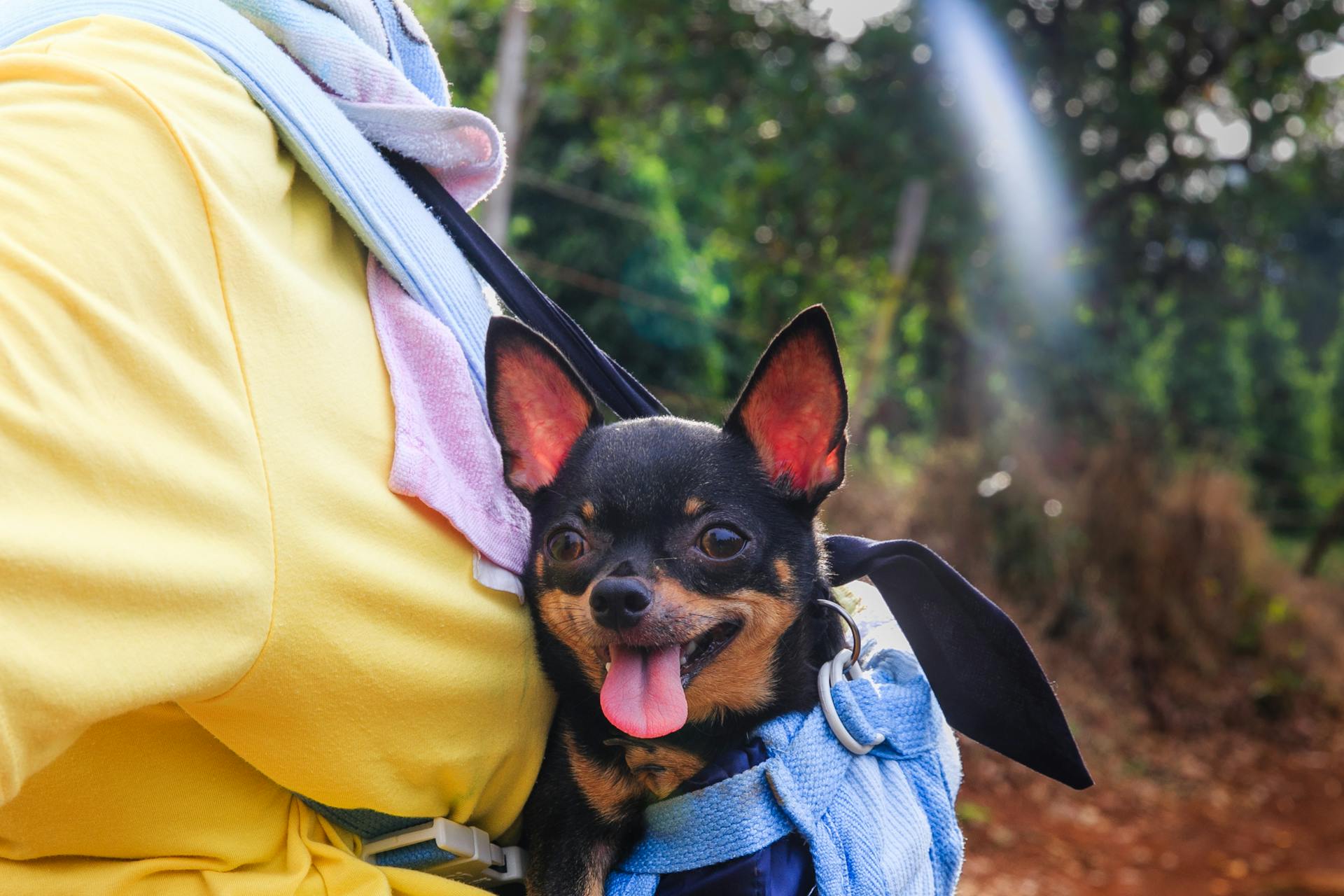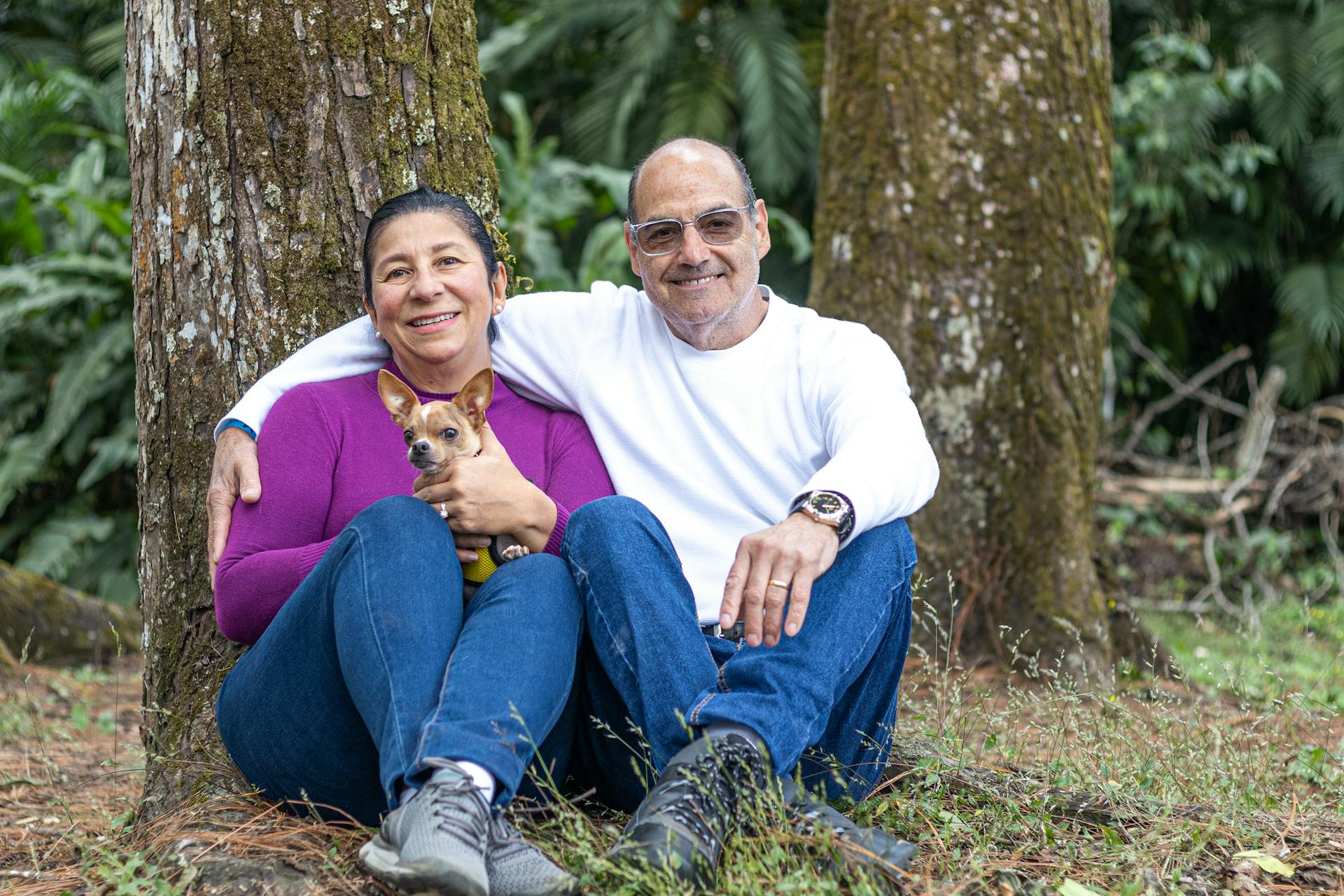
Mexican Chihuahuas have a rich history that dates back to the ancient Mayans and Aztecs. They were considered sacred animals and were often buried with their owners to ensure a smooth transition into the afterlife.
These small dogs were bred to be companions and were known for their loyalty and affection towards their families. They were also valued for their unique characteristics, such as their large eyes and erect ears.
Mexican Chihuahuas come in a variety of coat lengths and colors, including short-haired, long-haired, and a range of colors like fawn, chestnut, and blue. They are also known for their small size, with adults typically weighing between 2-8 pounds.
Their small size belies their bold and confident personalities, making them a popular choice as pets.
Additional reading: Why Are Chihuahuas so Small
History of Chihuahuas
The Chihuahua breed has a rich and fascinating history that spans thousands of years. The first Chihuahua was registered by the American Kennel Club in 1904 and was named Midget.
Most people in the early 1900s wanted dogs that could serve a purpose on farms, but Chihuahuas were considered useless due to their small size. People thought they were too delicate to herd livestock or perform other tasks.
One of the myths going around back in the day was that having a Chihuahua sleep next to a person in their bed would transfer their illness to the dog. This superstition was believed to be true, and some people even tried it with tragic results.
The Chihuahua breed originated in ancient Mexico and is considered one of the oldest breeds of canines in Mexico. The Techichi, a Mayan breed of dogs, is believed to be the ancestor of the Chihuahua.
Techichis were described as being extremely tiny and were used by the Toltecs for religious purposes, food, and companionship. They were even believed to be sacred by some.
In 1850, Techichi dogs were found in the Mexican state of Chihuahua near old ruins built by Emperor Montezuma. This is where the breed is believed to have gotten its name.
Chihuahuas were bred as companions and as sacred animals. They were popular as sacrifices for religious ceremonies and rituals, and were even believed to guide the soul to the underworld after death.
Wheeled dog toys that depict both apple head and deer head varieties of the Techichi were found at Tres Zapotes in Veracruz, Mexico dating back to 100 AD. This is just one example of the many relics that show the ancient history of the Chihuahua breed.
Here's an interesting read: How Long Do Applehead Chihuahuas Live
Chihuahua Characteristics
Chihuahuas are known for their tininess, making them lovable lap dogs.
These tiny dogs have the longest lifespan of any other dog breed, with some living well past the age of 20.
Chihuahuas are also known for not backing down to other dogs, no matter how big they are.
Their over-the-top personalities can be a bit fussy, earning them the nickname "spicy little tamales".
In 2021, Chihuahuas were listed as the 37th most popular dog in America, but I think they're the most popular breed out there!
Explore further: Cool Mexican Dog Names
Chihuahua in America
The first Chihuahua was registered by the American Kennel Club in 1904 and was named Midget.
In the early 1900s, Chihuahuas weren't very popular in the United States because most people lived on farms and wanted dogs that could serve a purpose.
Because of their small size, Chis were considered useless on the farm.
One of the myths going around back in the day was that having a Chihuahua sleep next to a person in their bed would transfer their illness from the human to the dog.
During the 1960s, the population in cities started to boom, and people were now wanting a smaller dog that was suitable for household living and companionship.
The smallness of the Chihuahua breed pertained well to city folks, so the popularity of Chis started to rise.
Chihuahuas were first popular in the states that border Mexico, such as Arizona, Texas, and New Mexico.
Challenges in Dog Breeds
One of the biggest challenges in owning a Mexican Chihuahua is their small size, which can make them prone to hypoglycemia. Their tiny stomachs can't handle large meals, and they need to eat frequently throughout the day.
Their delicate features also make them more susceptible to injury, especially from rough handling or falls. This requires extra care and attention when interacting with them.
Mexican Chihuahuas can be difficult to train due to their strong will and independent nature. They require consistent, positive reinforcement training from an early age.
Their short coats require minimal grooming, but their big eyes and delicate features need regular cleaning to prevent tear stains and infections.
For more insights, see: How Far Can Chihuahuas Walk
Frequently Asked Questions
How much is a Mexican Chihuahua worth?
The cost of a Mexican Chihuahua can range from $50 to $2,450, influenced by factors like location, breeder reputation, and coat color. The actual price may vary, so it's worth researching further to find the best fit for your budget and needs.
What is an Aztec Chihuahua?
The Aztec Chihuahua is a breed that originated from the Techichi, a small dog kept by Aztec nobility, and was later developed into the modern Chihuahua through crossbreeding with the Xoloitzcuintli. This ancient breed has a rich history and unique characteristics that set it apart from other small dog breeds.
What did Mexicans use Chihuahuas for?
In ancient Mexico, Chihuahuas were used as a food source, a Ratter, and a beloved companion. They served multiple purposes, highlighting their versatility and importance to the Toltec people.
Are Chihuahuas related to Xoloitzcuintli?
Yes, Chihuahuas are believed to be a cross between the Xoloitzcuintli and another breed, with the Xoloitzcuintli being a key ancestor of the modern Chihuahua. The Xoloitzcuintli's influence is evident in the Chihuahua's unique characteristics and history.
Sources
- https://www.akc.org/expert-advice/lifestyle/mexican-dog-breeds-xoloitzcuintli-chihuahua/
- https://www.dogster.com/dog-breeds/mexican-dog-breeds
- https://planetchihuahua.com/facts-trivia/chihuahua-history-mexico/
- https://ilovemychi.com/history-and-origins-of-chihuahuas/
- https://nuestrostories.com/2023/11/chihuahua-history/
Featured Images: pexels.com


